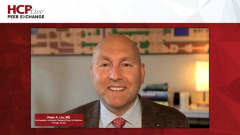
Defining Treatment Success in Patients With Atopic Dermatitis
Raj Chovatiya, MD, PhD, and Brittany G. Craiglow, MD, share their opinions on how they assess and what they define as treatment success in their pediatric patients suffering from atopic dermatitis.
Episodes in this series

Raj Chovatiya, MD, PhD: I want to ask you, Britt, how do you measure treatment success? What does success look like to you?
Brittany G. Craiglow, MD: I think it’s very individualized. For me, if a disease is at all affecting the way a patient interacts with the world, then I think it’s time to do more, to escalate. If they’re still waking up scratching, if they’re having time where they miss school, if they’re uncomfortable any amount of time. If they have a couple of flares here and there, where they use topicals for a few days, and it really doesn’t interfere, fine. But I think when it is making an impact on their life…. Oftentimes, I’ll ask families on a scale from 0 to 10—0, it’s no big deal, 10, it’s ruining your life or your kid’s life—for me, once we’re hitting 4, 5, 6, we’re not doing that great, in my opinion. Again, before, depending on the choices, maybe we would tolerate a little worse control, but that’s a sign that we could do better. It is sort of about the patient experience. Some people, their skin looks terrible, but they’re actually not that itchy and it doesn’t bother them that much. It’s like having acne. Some people, they have 3 pimples and it’s literally ruining their life, and then other people can have a lot more, and they’re OK with it. For me, it’s all about, “If you’re happy, I’m happy. If you’re not, I’m not.” I think the patient experience is so important.
Raj Chovatiya, MD, PhD: The work that myself and others have done in the patient-reported outcome field, taking a look and comparing it with some clinician-reported outcomes, really goes to support exactly what you’re saying in a more numerical aspect. Oftentimes, what we see and experience and grade people as, does not match up extremely well with what people are experiencing, both in terms of people who are happy and people who are not happy. I think that the patient and caregiver perspective is huge when it comes to figuring out just how well you’re doing. You’re right, I’ve definitely seen some people who are what I would say are moderate, severe or higher, and they’re like happy as a clam. I think we need to sort of push the bar on treatment, but obviously, I want to respect where they are vs other patients where there are just maybe a couple of small areas of involvement, but it’s driving them crazy. I wouldn’t think it’s that big of a deal, but they would tell me, “You’ve got to step things up because nothing is really working.” And so, taking the extra minute, is what I tell people. It’s what I tell my residents all the time. Just ask them what they’re feeling and how this is impacting their life. You end up sometimes changing your entire perspective of first, how bad things are, and then what success actually looks like when it comes to treatment.
Transcript Edited for Clarity
Newsletter
Access practical, evidence-based guidance to support better care for our youngest patients. Join our email list for the latest clinical updates.





